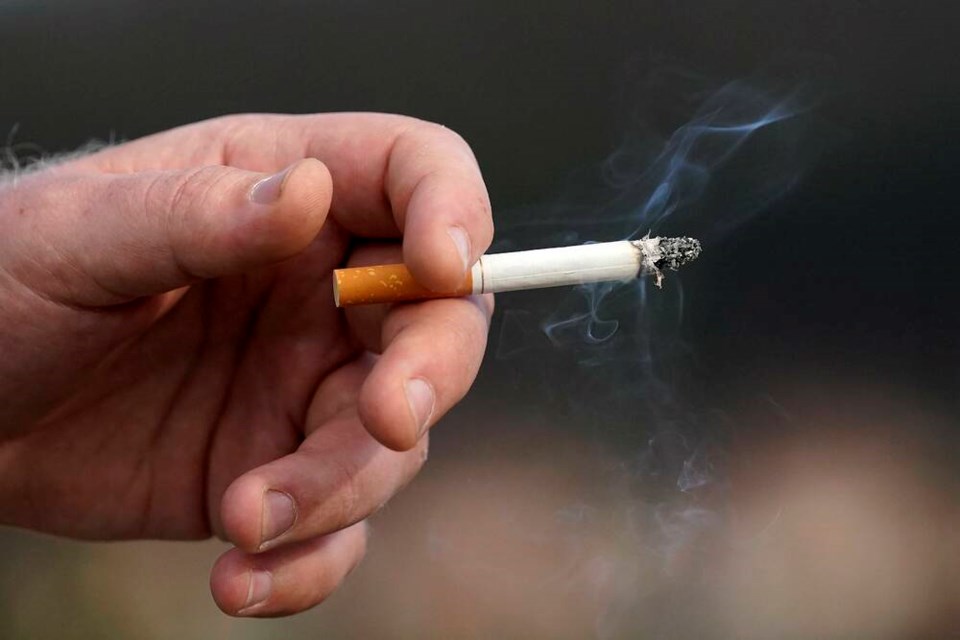A commentary by a member of the endocrinology division at St. Paul’s Hospital in Vancouver, who is also a clinical assistant professor at the University of British Columbia.
It is approaching three generations since the immense dangers of smoking were made crystal clear to society. Nevertheless, smoking remains the leading preventable cause of death in Canada and worldwide, killing seven million annually, including 45,000 Canadians.
Our standard small, one-at-a-time, public health countermeasures, such as Canada’s recently requiring warnings on individual cigarettes, are never going to be enough to free civilization from this multifaceted malevolent addiction.
Bolder and broader approaches are our only hope.
Under the “Smoke-Free Generation,” the legal age of purchase of cigarettes would increase by a year annually in the given jurisdiction.
Thus, for anyone under 18 it would amount to a lifetime ban without at all impacting older, pre-existing, smokers. It represents an ingenious way of navigating society out of tobacco’s more than century-old minefield.
However, until the past few months, recent fortunes for this decade-plus old idea were on a downturn.
A new government in New Zealand repealed its landmark about-to-be-world’s-first such national legislation and Malaysia, poised to be the second, did the same.
Yet, just when all hope for the idea seemed lost, U.K. Prime Minister Rishi Sunak announced intentions to implement it there, and last month Prince Edward Island proposed studying the same, becoming the first jurisdiction in Canada to do so.
In recent years, P.E.I. has taken over the lead among the Canadian provinces in fighting tobacco. In 2019, it became the only province so far to adopt age 21 as the legal age for purchase of both tobacco and vaping products — the age that is countrywide in the U.S.
It is also looking at restricting new point-of-sale stores to only specialty retailers, prohibiting it in new convenience shops or gas stations, a much-needed supply-side measure, which could then easily allow for other controls to be superimposed.
British Columbia, by contrast, has long since given up its spot as a leader. It remains the only province that allows cigarette sales in pharmacies.
Furthermore, in 2018, B.C. missed an opportunity to lead in implementing smoke-free multi-unit dwellings. A delegation, strongly supported by the public and public health organizations, from now defunct Airweshare had met with the then health minister, with a seemingly positive response, but was never commented on again.
Given that hardly anyone ever takes up smoking after the age of 21, and 70 per cent of adult smokers state that they want to quit, smoking is not a societal parasite without its strategic weaknesses.
Opportunity is knocking, with all provinces in closed-door negotiations with the industry after class-action lawsuits forced them into insolvency protection.
However it is beginning to look as if a failure of political will and imagination may just lead to a monetary settlement, rather than one tailored to help wind down the industry. That settlement will end up being financed through the industry’s sole available approach of recruiting new nicotine addicts, similar to what happened in the U.S. in the 1990s.
There is, however, an elephant in the room, vaping. After being allowed through the front door due to claims of being an avenue toward helping pre-existing smokers quit, what is beyond question is that there has been a “unintended” meteoric rise in vaping rates among never-smoking youth.
Young adults now have Canada’s highest overall rate of nicotine use. Should vaping be banned as well for the smoke-free generation?
Clearly the ideal approach would be to do so. However it has not been included by any of the jurisdictions that have considered implementing a smoke-free generation so far, and the perfect should not be the enemy of the politically achievable.
As odious as it may be, permitting vaping (with very strong restrictions, including age 21), may serve to make getting rid of cigarettes more tenable, given that youth have shown their clear preference for the former.
The danger of trying unsuccessfully to include it would be that of missing out on this historic opportunity altogether, and ending up with the industry’s dream scenario: a dual-use pandemic, for which early evidence suggests multiplicative risk.
There is also now some suggestion that smoking may be coming back into fashion, as the truer rebel’s choice. Society must act now.
P.E.I. has announced a bold move that can ultimately lead to an end-game win against the tobacco industry.
British Columbia and the rest of Canada should show will and conviction, and join them in their efforts to get rid of this unmitigated society scourge.
>>> To comment on this article, write a letter to the editor: [email protected]




